WMG Professor recognised in India-UK Achievers Award Class of 2025
WMG at The University of Warwick’s Head of Safe AutonomyLink opens in a new window, Professor Siddartha KhastgirLink opens in a new window, has been named in the Class of 2025 at the India-UK Achievers Honours.
Professor Khastgir was recognised in the ‘Education, Science and Innovation’ category, for his outstanding research impacts and contributions to India-UK relations.
Organised by the National Indian Students and Alumni Union (NISAULink opens in a new window) UK in collaboration with the British Council in India and the UK Government’s Department for International Trade, the awards recognise Indian students and alumni in the UK who make significant contributions to education, art, culture, and other social sectors.
AI Opportunities Action Plan
Expert comment from Professor Siddartha Khastgir, Head of Safe Autonomy at WMG on the UK Government’s AI Opportunities Action Plan
“I welcome this timely and ground-breaking AI Opportunities Action Plan by the UK Government. We thank both the UK Government and Matthew Clifford CBE for laying a solid foundation for the UK’s AI development and deployment in the coming decade.
‘‘AI has huge potential to help develop different life-changing technologies. However, AI, when used in safety-critical applications such as Self-Driving vehicles and Advanced Driver Assistance technology, needs to be trusted. With the lack of internationally-agreed methodologies or mechanisms to prove that AI is safe, we urge the government to prioritise safe AI in this plan.
‘‘We welcome the announcement of AI Growth Zones, which could attract significant investment into the UK in high-growth sectors such as Safe Automated Mobility. For example, at WMG we have partnered with leading AI developer Wayve on our £1.9 million-research project, DriveSafe AI, to develop scalable engineering safety guidelines and mechanisms to prove AI is safe for self-driving technology while sharing with the ecosystem and building on international standards like ISO/PAS 8800.’’
Read more about WMG’s Safe Autonomy research here: https://warwick.ac.uk/fac/sci/wmg/research/research-areas/safeautonomy
WMG researcher wins prestigious EPSRC award
 Congratulations to Dr Xingyu ZhaoLink opens in a new window, from WMG at the University of Warwick’s Safe Autonomy research group, who has been awarded the EPSRC’s prestigious New Investigator AwardLink opens in a new window (NIA).
Congratulations to Dr Xingyu ZhaoLink opens in a new window, from WMG at the University of Warwick’s Safe Autonomy research group, who has been awarded the EPSRC’s prestigious New Investigator AwardLink opens in a new window (NIA).
The purpose of the NIA scheme is to address a gap identified in the funding landscape and support researchers to develop their own research vision.
Dr Xingyu ZhaoLink opens in a new window, Assistant Professor in Safety-Critical Systems, was praised for his project entitled: "Harnessing Synthetic Data Fidelity for Assured Perception of Autonomous Vehicles."
The project focused on scenario-based virtual testing for Autonomous Vehicle (AV) safety, developing a rigorous framework to define and quantify synthetic data fidelity, and explore how this impacts public confidence.
By advancing synthetic data and AV safety research, Dr Zhao’s research supports industry innovation, shapes safety standards, and ultimately enables the safe deployment of autonomous vehicles.
Expert comment on the Regulatory Innovation Office from Professor Siddartha Khastgir
Professor Siddartha Khastgir, Head of the Safe Autonomy Research Group at WMG, University of Warwick, comments on the announcement of the Regulatory Innovation Office.
Professor Khastgir said: “The creation of the Regulatory Innovation Office (RIO) by the government is welcome. It’s good to see recognition that regulation can be used for implementing innovation and supporting the UK to be at the forefront of global science and technology.
“I hope the RIO will draw on learnings between the various transport domains (land, air, and marine) to develop timely regulations for cross-cutting developments like connected and autonomous technology, and AI. WMG’s cross-domain safety assurance framework will provide scientific evidence that can support the RIO’s policymaking.
“I also urge the RIO to prioritise sector-specific regulations, especially in areas such as self-driving technology. This will enable developers to work from a more concrete set of requirements to develop the technology safely.”
Automated Vehicle Bill receives Royal Assent
Expert comment from Professor Siddartha Khastgir, Head of Safe Autonomy at WMG, University of Warwick.
‘‘I am thrilled that the Automated Vehicle (AV) Bill has received Royal Assent today. The Bill (now Act) has laid a sound regulatory foundation for the AV industry in the UK. This is a first but important step to introducing AVs safely to the UK’s roads.
"I support the government’s ambition that AVs should be as safe as a careful and competent human driver; we therefore, urge the government to undertake swift work on the secondary legislation with a more robust focus and detailed definition of the performance requirements, keeping safety as our highest priority going forward. This will also provide certainty and clarity for technology developers and the AV industry. WMG will continue to work with the UK’s policymakers and provide research evidence to underpin AV policies, including the secondary legislation.
“At WMG, we have also been advocating for ‘informed safety’, which means that users understand the limitations and capabilities of the technology and can use AVs within this safety limit. I am glad that the Act has a strong focus on tackling misleading marketing of AVs. Information about self-driving vehicles should be communicated precisely and transparently to the public so everyone feels safe and confident when engaging with AVs. The public is core to this technology: if they don’t trust it, they will never use it.
 “To bring the public on this self-driving journey and bridge the knowledge gap, the Partners for Automated Vehicle Education United Kingdom (PAVE UK) was co-founded earlier this year by WMG, the Department for Transport, the Department for Business and Trade, the Centre for Connected and Autonomous Vehicles and Transport for West Midlands to deliver accurate and inclusive public awareness and education programmes on self-driving technology.
“To bring the public on this self-driving journey and bridge the knowledge gap, the Partners for Automated Vehicle Education United Kingdom (PAVE UK) was co-founded earlier this year by WMG, the Department for Transport, the Department for Business and Trade, the Centre for Connected and Autonomous Vehicles and Transport for West Midlands to deliver accurate and inclusive public awareness and education programmes on self-driving technology.
“WMG will continue to work closely with the government and the eco-system to help set strong performance requirements, ensuring the safe deployment of self-driving vehicles on the UK’s roads, and enabling the country to be the hub of this transformational transport technology.’’
New national initiative to educate the public on automated vehicles (AVs)
Today (Wednesday 21st February 2024), WMG at The University of Warwick, has launched the Partners for Automated Vehicle Education United Kingdom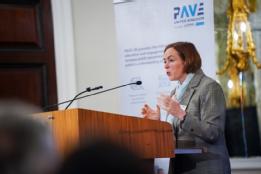 (PAVE UK) with the Department for Business and Trade, the Department for Transport, the Centre for Connected and Autonomous Vehicles (CCAV), and Transport for West Midlands, as its founding partners.
(PAVE UK) with the Department for Business and Trade, the Department for Transport, the Centre for Connected and Autonomous Vehicles (CCAV), and Transport for West Midlands, as its founding partners.
The PAVE UK initiative aims to build public confidence in self-driving technology through a programme of education and engagement, supporting the UK Government’s ambition to safely deploy self-driving vehicles on the road and its aim to make the UK the leader in artificial intelligence (AI).
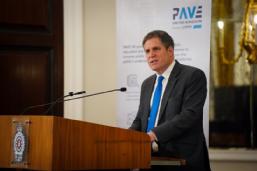 PAVE UK is the country’s first non-governmental organisation that advocates for and delivers public education and engagement programmes on automated vehicles. It launched today at the Royal Automobile Club in London, with Anthony Browne MP (Technology and Decarbonisation Minister), and Professor Sarah Sharples (Chief Scientific Adviser at the Department for Transport), as the keynote speakers. Over 100 technology developers, safety campaign groups, regulators, innovators, and industry leaders discussed how to ensure the public is engaged in the self-driving technology journey and how to accurately communicate AV safety messages with different stakeholders in society.
PAVE UK is the country’s first non-governmental organisation that advocates for and delivers public education and engagement programmes on automated vehicles. It launched today at the Royal Automobile Club in London, with Anthony Browne MP (Technology and Decarbonisation Minister), and Professor Sarah Sharples (Chief Scientific Adviser at the Department for Transport), as the keynote speakers. Over 100 technology developers, safety campaign groups, regulators, innovators, and industry leaders discussed how to ensure the public is engaged in the self-driving technology journey and how to accurately communicate AV safety messages with different stakeholders in society.
Professor Siddartha Khastgir, Head of Verification & Validation at WMG, University of Warwick said: "At WMG, we strive to enhance the safety of self-driving technology and ensure it is safe to operate on the roads. In taking a people first approach, the public should be paramount in the safety conversation and part of the journey during the development and deployment of self-driving vehicles on UK roads.
“PAVE UK will translate technical information into clear, comprehensive and accurate messaging to help communicate safety to the public in an inclusive and accessible manner. Future technology users and other road users will be equipped with the knowledge of benefits and limits of this new transport technology. PAVE UK will also bring together the self-driving ecosystem to tackle the technological challenges, speak honestly and accurately about system capabilities and limitations, and encourage innovators to put the public at the heart of this.”
PAVE UK will work closely with the entire UK Connected and Automated Mobility (CAM) ecosystem, to carry out education and engagement programmes, such as research-based educational materials packs, school outreach activities, community outreach, an online video library, webinars, and an online educational app. The programme will be delivered by WMG at the University of Warwick.
Nusrat Ghani MP, Minister for Industry and Economic Security, said: “The UK automotive sector is at the cutting edge of exploiting new innovative technologies. These have the potential to create jobs, grow the economy and accelerate how we reach net-zero.
“This government has shown time and time again that we're committed to creating the right conditions to boost UK advanced manufacturing, and the PAVE UK initiative will help cement the UK as a world leader in self-driving technology."
Technology and Decarbonisation Minister Anthony Browne said: “Self-driving vehicles have the potential to transform our transport sector, and PAVE UK will be a big part of this by raising awareness and embedding confidence in people throughout the country. In the meantime, we’re making sure that these vehicles are safe to use on our roads. Our Automated Vehicles Bill sets a rigorous standard for safety, whilst making sure that this country is where businesses can develop and deploy their cutting-edge technology.”
Organisations and schools wishing to participate in the programmes can contact PAVEUK@warwick.ac.uk
Ends
Note to editors
Additional quotes
Tara Andringa, Executive Director, PAVE said: "When PAVE was founded in 2019, it was a bet on the power of knowledge: we believed that if the public understands the facts of autonomous vehicles, we will see greater public trust in this incredibly promising technology. Our campaign both seeks to demystify automated vehicles– to explain how the technology works – and to help the public understand how these technologies could help to improve the safety, efficiency, and sustainability of our transportation system.
“While countries and regions have adopted different regulatory approaches to automated vehicles, the challenge of AV education is global in nature. Given the tremendous leadership from the UK both in its approach to AV policy and to civic engagement on the technology, we are incredibly excited for the influential role PAVE UK will play in leading public education. The PAVE ecosystem is thrilled for the launch of PAVE UK, and we will work together to build an engagement campaign that will create a template for AV education worldwide."
Automated Vehicles Bill: https://bills.parliament.uk/bills/3506
About WMG, University of Warwick
WMG is a world leading research and education group, transforming organisations and driving innovation through a unique combination of collaborative research and development, and pioneering education programmes.
As an international role model for successful partnerships between academia and the private and public sectors, WMG develops advancements nationally and globally, in applied science, technology and engineering, to deliver real impact to economic growth, society and the environment.
WMG’s education programmes focus on lifelong learning of the brightest talent, from the WMG Academies for Young Engineers, degree apprenticeships, undergraduate and postgraduate, through to professional programmes.
An academic department of the University of Warwick, and a centre for the HVM Catapult, WMG was founded by the late Professor Lord Kumar Bhattacharyya in 1980 to help reinvigorate UK manufacturing and improve competitiveness through innovation and skills development.
About PAVE UK
PAVE UK aims to bring the conversation about automated vehicles (AVs) to the public so that future users and technology developers can play a role in shaping our future.
By arranging education and engagement programmes around AVs, our goal is to increase the public’s awareness of the capabilities and limitations of the technology and build up societal acceptance and trust in this new transport innovation. We also aim to develop a correct user attitude to foster the safe deployment of AVs.
We strongly believe that by fully and transparently equipping the public with CAM technology knowledge, we could then achieve the potential benefits of the technology.
Media contact:
Annie Slinn
Communications Officer (Sciences)
Gabbie Lau
WMG Marketing and Communications Officer (Verification and Validation Research Group)
Expert comment from Professor Siddartha Khastgir
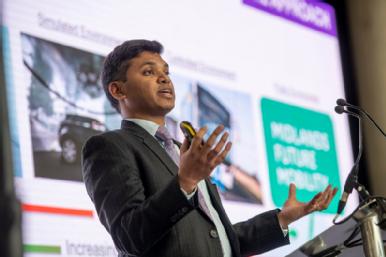 Professor Siddartha Khastgir, Head of Verification and Validation at WMG, University of Warwick, comments on the Government’s plans to introduce the primary legislation for automated vehicles in the upcoming parliamentary session, as announced in the King’s Speech today (Tuesday 7th November).
Professor Siddartha Khastgir, Head of Verification and Validation at WMG, University of Warwick, comments on the Government’s plans to introduce the primary legislation for automated vehicles in the upcoming parliamentary session, as announced in the King’s Speech today (Tuesday 7th November).
Professor Khastgir said: ‘‘We welcome the Government’s decision to introduce the primary legislation on automated vehicles in the King’s Speech today. Following on from the discussions at the AI Safety Summit last week, this very first legislation on AI-powered technology is an important step for the UK to reach its target of rolling out automated cars in 2025.
“Regulation is the key enabler for the safe introduction of automated vehicles on UK roads. Not only does it provide regulatory certainty for the industry, but it is also key to setting high safety thresholds and gaining the public’s trust. We urge the Government to ensure that the regulatory framework is robust and underpinned by strong research outcomes. International and national self-driving standards should be built upon when creating this legislation.
“We also urge the Government to speed up the secondary legislation on automated vehicles to provide more information on the engineering requirements. The Government needs to ensure public views are incorporated into this legislative journey and take future users’ viewpoints into account. As a result, along with the legislation, a public awareness programme should be introduced to ensure an accurate understanding of the capabilities and limitations of this emerging technology. The Government needs to act quickly to be at the forefront of this technology.
“WMG will continue to fully support the Government and the eco-system to develop research and evidence-based self-driving regulation in the UK.’’
Find out more about WMG’s Verification and Validation research here: https://warwick.ac.uk/fac/sci/wmg/research/cav/vandv/
Safety Must Come First: WMG Professor on Cruise Pausing Driverless Operations to Rebuild Trust
 Professor Siddartha Khastgir, Head of Verification and Validation at WMG, University of Warwick, comments on Cruise pausing all driverless robotaxi operations in the US to rebuild public trust.
Professor Siddartha Khastgir, Head of Verification and Validation at WMG, University of Warwick, comments on Cruise pausing all driverless robotaxi operations in the US to rebuild public trust.
“Safety is the number one priority when commercialising self-driving vehicles, we should never compromise safety even though this is a fast-paced technology. The industry and autonomous vehicle developers and operators need to have a thorough review of the current incidents and be more open and transparent regarding their safety assurance processes and systems.
“Safety messages and information should be communicated to the public to gradually build up societal trust and ensure that technology users and road users are well-informed about this new technology’s capabilities and limitations.
“As a world-leading research institution, WMG is working closely with international and national policymakers, regulators, and industry to improve the safety of self-driving vehicles. We encourage the ecosystem to collaborate further to gain the public’s confidence in this emerging transport technology.”
Find out more about WMG’s Verification and Validation research here: https://warwick.ac.uk/fac/sci/wmg/research/cav/vandv/
WMG with Solihull Council secure £300,000 for self-driving shuttle feasibility study
WMG at The University of Warwick, Solihull Council, National Highways, Transport for West Midlands, ZF, Aurrigo, Syselek and Liftango have successfully secured £300,000 to deliver a project looking into the feasibility of a self-driving shuttle service in the West Midlands.
The project will explore how a new automated transport link between Blythe Valley Business Park, near Shirley, and the new HS2 rail station in Solihull could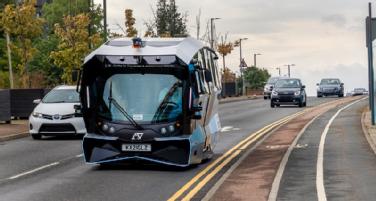 operate in the future. The feasibility study will consider all aspects of the technology required in order to provide a safe and reliable automated public transport service between these important commercial centres. The proposed route would use the existing road network travelling along the M42 from Junction 4 and utilise the new Junction 5a currently under construction.
operate in the future. The feasibility study will consider all aspects of the technology required in order to provide a safe and reliable automated public transport service between these important commercial centres. The proposed route would use the existing road network travelling along the M42 from Junction 4 and utilise the new Junction 5a currently under construction.
As a world-class research institution with leading capabilities in the verification and validation of safety assurance of self-driving technologies, WMG will apply its Operational Design Domain (ODD) based Safety Assurance research methodologies to the specific project challenges.
This project is part of the wider Midlands Future Mobility (MFM) initiative, led by WMG. The MFM vision is to achieve zero road incidents, net-zero emissions and inclusive transport in the West Midlands. MFM enables stakeholders from across mobility to address the interlinked challenges of technology, policy, and behaviour to realise the vision.
Cllr Ken Hawkins, Solihull Council Cabinet Member for Environment & Infrastructure, said: “Connected Automated Vehicle (CAV) technology has the potential revolutionise the way we get around our towns, cities and rural areas. Working with our partners we are excited to be undertaking this latest project.
“We’ve already carried out a series of successful pathfinder trials here in Solihull, using our own automated shuttle, and have led the way in showing how it is possible to practically and safely incorporate automated vehicles into our existing transport infrastructure. We are now taking the next step and undertaking the vital feasibility work necessary in order to start thinking about more ambitious deployments and establishing new commercial public transport services.
“The outcomes from the study are likely to inform self-driving mobility challenges not just here in Solihull but nationwide.”
Jonathan Smith, Midlands Future Mobility Programme Manager said: "The business case for scaling new mobility solutions is complex. It involves a granular understanding of the use case, safety, users, operations, and infrastructure. This project brings together a group of diverse experts to apply state of the art research and knowledge to address this question. Of critical importance is that the outcomes of this feasibility will inform mobility business cases both in the Midlands and the UK as a whole."
More information about this project
Partners: Solihull Metropolitan Borough Council (Lead), Aurrigo, Syselek (Uk) Ltd, Liftango Ltd, ZF Services UK Limited, West Midlands Combined Authority, Highways England, University of Warwick
Grant awarded: £300,000 (£197,664 from Centre for Connected and Autonomous Vehicles’ Commercialising Connected and Automated Mobility programme and balance is made up by the commercial partners).
Find out more about WMG’s Validation and Verification research here: Verification and Validation (warwick.ac.uk)
Note to editors
Media contact:
Annie Slinn
Communications Officer (Sciences)
Gabbie Lau
WMG Marketing and Communications Executive
WMG’s Professor Khastgir quoted in parliamentary inquiry’s call for action on self-driving vehicles
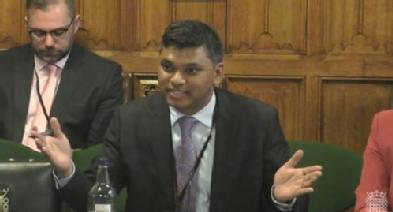 Today (Friday 15th September), the House of Commons Transport Select Committee released its cross-party report on self-driving vehicles, calling for urgent legislation to be proposed by the Government to support innovators, regulate this emerging technology sector, and give the public confidence in the safety of connected and autonomous mobility.
Today (Friday 15th September), the House of Commons Transport Select Committee released its cross-party report on self-driving vehicles, calling for urgent legislation to be proposed by the Government to support innovators, regulate this emerging technology sector, and give the public confidence in the safety of connected and autonomous mobility.
Professor Siddartha Khastgir, Head of Verification and Validation at WMG, University of Warwick, who gave evidence to the inquiry and is quoted in the report, said:
"The Transport Select Committee is right to say self-driving vehicles (SDV) are a British success story and that our domestic innovators have energy, creativity, and expertise.
"To secure this progress, we need to ensure consumers can be confident of the safety of SDVs, because, as I told the Committee we can have the safest technology, but if we cannot convince the public, they will never use it.
"So, I’m delighted the Committee is calling for the Government to ‘bring forward and pass comprehensive legislation in the next parliamentary session’ to put in place a robust regulatory framework For SDVs, and I look forward to working with industry, ministers, civil servants and parliament to ensure the public can be confident in the safety of the next generation of transport innovation."
Professor Khastgir provided written and oral evidence to the Transport Committee’s Self-Driving Vehicles Inquiry. His evidence has been referenced (significantly) in this report, including the use of the Operational Design Domain (ODD) to design driving conditions so that SDVs can be tested and operate safely; the importance of ‘informed safety’ that the technology developers need to equip the users about the capabilities and limitations of the self-driving technology so they can use the technology safely.
Read the report here: https://committees.parliament.uk/committee/153/transport-committee/news/197460/legislation-needed-to-continue-great-british-success-story-of-selfdriving-vehicles/Link opens in a new window

